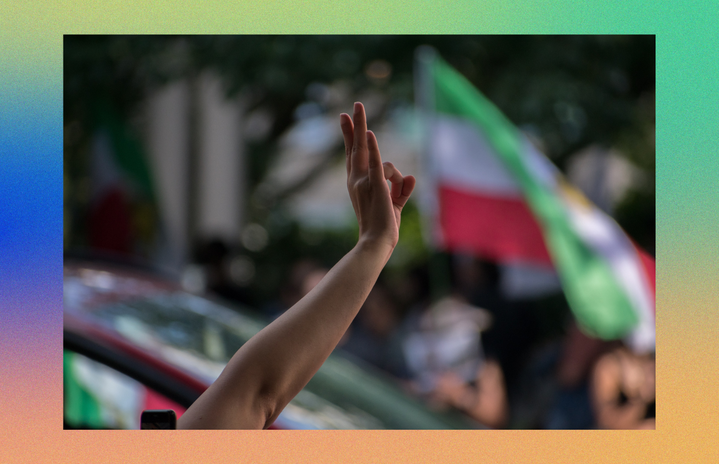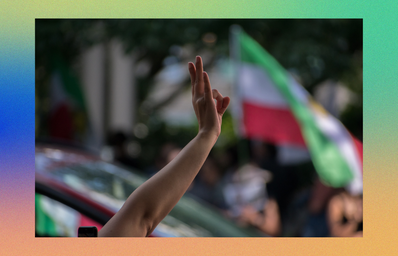As a Persian American Jew whose family came to the U.S. in 1979 following the Iranian Revolution, I can’t stop thinking about the men and women in Iran who have been protesting in the streets since late September.
The protests in Iran against the Islamic regime were sparked by the tragic death of 22 year-old Mahsa Amini, a young Iranian girl who was arrested by the Iranian police for not wearing her hijab correctly. Amini was taken into custody and allegedly beaten for three days before succumbing to her death due to her injuries. Outraged young women, men, and children have taken to the streets since the news of her death broke, and protests have been going on nationwide ever since. Viral videos of women cutting their hair and burning their hijabs in the street have been circulating on social media for months now. Unfortunately as of today there has been “at least 270 people dead and 14,000 arrested, according to the group Human Rights Activists in Iran.”
I have been feeling helpless since the women’s rights protests began, thinking that because I can’t go to Iran, there’s no way I can help and truly make a difference. However, a few weeks ago, the band Coldplay proved that there are many ways to participate in a protest, and one of the most powerful methods of fighting for sociopolitical change is through music.
While on tour in late October, at their concert in Buenos Aires, Argentina, Coldplay invited exiled Iranian actress Golshifteh Farahani to sing the anthem of the current Iranian movement for women’s rights, “Baraye,” written and originally sung by Shervin Hajipour. The actress sang the song in Farsi, and the band also played a video of Hajipour singing the song with subtitles in Spanish for their audience members to understand. The performance of “Baraye” was “streamed via satellite to cinemas in 81 countries.” The actress’ heartfelt performance touched the hearts of millions of viewers around the globe, urging them to do their part to help the Iranian people.
The protest song “Baraye” is almost entirely comprised of lyrics written by Iranian protesters. Haijpour, a singer-songwriter, composed the song “with verses taken from 31 messages that citizens had posted online sharing their individual misery, pain and grief.” The word “baraye” itself can be translated to mean “‘For …’ or ‘Because of …’ in Farsi.” Hajipour first uploaded what would become a viral protest anthem song “to his Instagram account on Sept. 28.” After the song went viral on social media, Hajipour was “arrested by the Iranian government on September 29” and the song was taken down from his Instagram. The 25 year old singer-songwriter has “since been released on bail but has gone silent.” Since its release, the song has been covered by numerous artists internationally, with an English version called “For Woman, Life, Liberty (Baraye)” released by another Iranian artist, Rana Mansour, on October 7. A few days later, on October 10, Variety reported that hundreds of thousands of people have nominated Hajipour’s song a new Grammy Award called the Special Merit Award.
Farahani, who sang with Coldplay, is an Iranian film, TV, and theater actress, known for her work M is for Mother (2006), Body of Lies (2008), Rosewater (2014), Girls of the Sun (2018), and Extraction (2020). She has been banned from working in Iran or returning to live there by the “Ministry of Culture and Islamic Guidance for not wearing a headscarf at the New York premiere of Ridley Scott’s CIA thriller Body of Lies, where, playing opposite Leonardo DiCaprio, she became the first Iranian actress to appear in a Hollywood film since the 1979 revolution.” Having not returned to Iran since 2008, Farahani now resides in France where she continues to advocate for Iranian women and women’s rights.
Historically, many artists have written and performed protest songs in order to advocate for the change they wished to see. Well known protest songs include MILCK’s “We Won’t Go Back,” Green Day’s “American Idiot,” Public Enemy’s “Fight the Power,” John Lennon’s “Imagine,” Beyoncé’s “Freedom,” and M.I.A.’s “Paper Planes.” Coldplay has even written their own protest song, “Violet Hill,” an anti-war song released in 2008 as the lead single on their album Viva la Vida or Death and All His Friends.
The protests show no signs of stopping. Just recently, the Iranian government began sentencing some of those arrested to death for their participation in the protests. Moreover, reports of children being killed by the Iranian government have come out, a ten-year old “boy named Kian Pirfalak (was) one of seven people killed during Wednesday’s protests in the southwestern city of Izeh.” CNN reported that deputy spokesman for the UN Secretary-General Farhan Haq spoke on behalf of the United Nations and said that it is “deeply worried about growing violence related to the ongoing popular protests in Iran.”
There are many ways that we can help Iranians in their fight for freedom. There are numerous human rights organizations that you can donate to, such as the Center for Human Rights in Iran, the Iranian American Women Foundation, and Children of Persia. You can also join protests in your local cities to show your support for Iran, and post online about what is going on to raise awareness in the global community.


